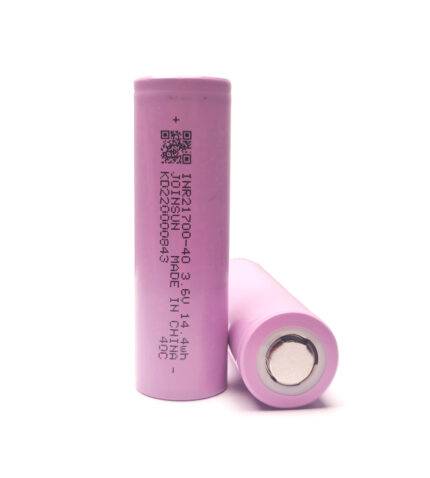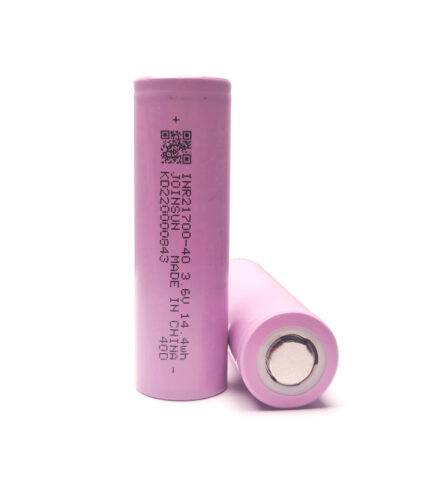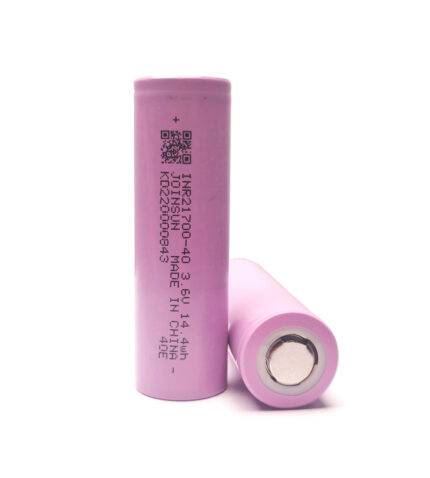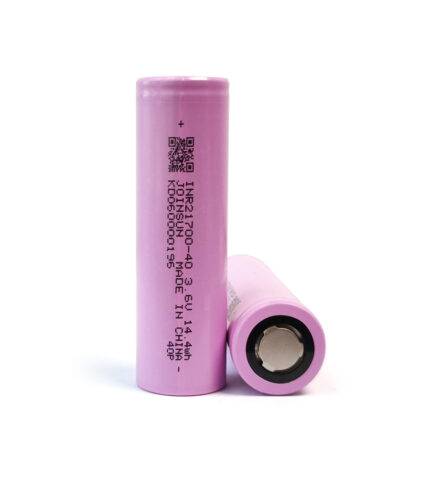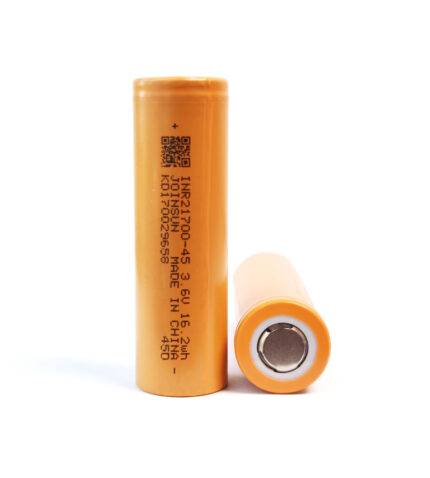21700
- Forklift Lithium Battery
- Best Seller 2024
- Rack-mounted Lithium Battery
- Golf Cart Lithium Battery
- 12V Lithium Battery
- 24V Lithium Battery
- 36V Lithium Battery
- 48V Lithium Battery
- 60V Lithium Battery
- 72V Lithium Battery
- 96V Lithium Battery
- 21700
- C&I ESS
- eBike Lithium Battery
- All-in-One Home ESS
- PowerWall HESS
- Car Starter Lithium Battery
- Portable Power Station
- Other
Redway High-Performance 21700 Series Cells comprise various models, including 21700 cells with capacities of 4000mAh, 4500mAh, 5000mAh, and 5500mAh. These cells are used in FPV drones, portable power stations, power banks, e-bike lithium batteries, garden tools, power tools, electric scooters, electric toys, and more. Engineered with precision, these cells ensure top-notch performance, reliability, and longevity.
Showing all 5 results
21700 Lithium Cell FAQs▾
What are the differences between 18650 and 21700?
The main difference between 18650 and 21700 batteries is their size and capacity. The 21700 battery is larger and can provide more capacity compared to the 18650 battery. While the maximum capacity of an 18650 battery is around 3500mAh, the 21700 battery can offer up to 5000mAh. The larger size of the 21700 battery allows for increased energy storage in devices that use this type of battery.
- Size and Capacity: The 21700 battery is larger in size compared to the 18650 battery, allowing for more capacity. While the maximum capacity of an 18650 battery is around 3500mAh, the 21700 battery can provide up to 5000mAh.
- Energy Storage: The larger size of the 21700 battery enables it to store more energy, making it suitable for devices that require higher energy demands.
- Compatibility: It’s important to note that 18650 and 21700 batteries have different sizes, which means they may not be interchangeable in devices designed for a specific battery type.
The main differences between 18650 and 21700 batteries lie in their size and capacity. The 21700 battery offers a larger size and higher capacity, providing increased energy storage compared to the 18650 battery. When choosing between these batteries, it’s crucial to consider the specific requirements and compatibility of the device in which they will be used.
Are 21700 batteries better than 18650?
The main advantage of 21700 batteries over 18650 batteries is their larger size and higher capacity. 21700 batteries can provide more power and energy storage compared to 18650 batteries. This means that devices using 21700 batteries can have longer runtime and higher performance. However, the choice between 21700 and 18650 batteries depends on the specific requirements and compatibility of the device.
- Larger Size and Higher Capacity: 21700 batteries have a larger size and higher capacity compared to 18650 batteries. This allows them to provide more power and energy storage.
- Longer Runtime and Higher Performance: Devices using 21700 batteries can have longer runtime and higher performance due to the increased power and capacity they offer.
- Device Requirements and Compatibility: The choice between 21700 and 18650 batteries depends on the specific requirements and compatibility of the device. It is important to consider factors such as size, voltage, and compatibility when selecting the appropriate battery.
21700 batteries offer advantages in terms of larger size, higher capacity, longer runtime, and higher performance compared to 18650 batteries. However, the choice between these batteries depends on the specific requirements and compatibility of the device. Consider factors such as size, voltage, and compatibility to select the battery that best meets the needs of your device.
Are 21700 and 18650 batteries interchangeable?
From a chemistry and voltage standpoint, 21700 and 18650 batteries are interchangeable. However, the physical size difference between them may affect their compatibility in certain devices. While an 18650 battery can work in a 21700-size flashlight, it’s essential to check the device’s specifications and ensure proper fit and performance.
- Chemistry and Voltage Compatibility: From a chemistry and voltage standpoint, 21700 and 18650 batteries are interchangeable. They share similar characteristics and can deliver the required power for various devices.
- Physical Size Difference: The main difference lies in the physical size. 21700 batteries are larger compared to 18650 batteries. While an 18650 battery can work in a 21700-size device, it’s crucial to consider the device’s specifications and ensure proper fit and performance.
- Device Compatibility: It’s essential to check the specifications of the device in question to determine if it can accommodate both 21700 and 18650 batteries. Some devices may require a specific battery size for optimal performance.
From a chemistry and voltage standpoint, 21700 and 18650 batteries are interchangeable. However, the physical size difference between them may affect their compatibility in certain devices. It’s important to check the device’s specifications and ensure proper fit and performance when considering the use of either battery type.
Can I use a 21700 battery instead of 18650 ?
Yes, you can use an 18650 battery instead of a 21700 battery in devices like flashlights. From a chemistry and voltage standpoint, there is no reason why an 18650 battery won’t work in a 21700-size flashlight. However, the option to use 21700 batteries may depend on the specific device and its compatibility with different battery sizes.
- Chemistry and Voltage Compatibility: From a chemistry and voltage standpoint, there is no issue with using an 18650 battery instead of a 21700 battery in devices like flashlights.
- Physical Size Difference: The main difference between 21700 and 18650 batteries is their physical size. While an 18650 battery can work in a 21700-size flashlight, the option to use 21700 batteries may depend on the specific device and its compatibility with different battery sizes.
- Device Compatibility: It’s important to consider the specifications and compatibility of the device in question when deciding whether to use a 21700 or 18650 battery. Some devices may require a specific battery size for optimal fit and performance.
From a chemistry and voltage standpoint, using an 18650 battery instead of a 21700 battery in devices like flashlights is feasible. However, the option to use 21700 batteries may depend on the specific device and its compatibility with different battery sizes. Consider the device’s specifications and battery requirements to determine the appropriate battery choice for optimal fit and performance.
How to charge 21700 battery?
To charge a 21700 battery, use a USB-C charging cable and connect it to a USB power source, like a laptop or a solar panel. Ensure the battery is properly connected and let it charge until full. Charging times may vary depending on the battery capacity and the power source used.
- USB-C Charging Cable: Use a USB-C charging cable to connect the 21700 battery to a power source.
- USB Power Source: Connect the USB-C cable to a USB power source, such as a laptop or a solar panel. Ensure that the power source is compatible with the battery’s charging requirements.
- Charging Process: Once the battery is properly connected, allow it to charge until it reaches full capacity. The charging time may vary depending on the battery’s capacity and the power source used.
To charge a 21700 battery, simply connect it to a USB power source using a USB-C charging cable. Ensure that the battery is properly connected and allow it to charge until it reaches full capacity. Remember to use a compatible power source and follow the battery manufacturer’s instructions for optimal charging performance.
How long does it take to charge a 21700 battery?
The charging time for a 21700 battery can vary depending on factors such as the charger used and the battery capacity. On average, a 21700 battery can take around 4 hours to fully charge. However, the charging time may be shorter or longer depending on the specific charger’s amperage and the battery’s capacity.
- Charging Time Range: The charging time for a 21700 battery can range from 1.5 to 4 hours, depending on the charger and the battery’s capacity.
- Charger Amperage: The amperage of the charger used can affect the charging time. Higher amperage chargers generally charge batteries faster.
- Battery Capacity: The capacity of the 21700 battery also plays a role in the charging time. Higher capacity batteries may require more time to fully charge.
The charging time for a 21700 battery typically falls within the range of 1.5 to 4 hours, depending on factors such as the charger’s amperage and the battery’s capacity. It’s important to consider these factors when charging a 21700 battery to ensure optimal charging time and performance.
How long does a 21700 battery last?
A typical 21700 battery can be recharged between 300 and 500 times before its capacity begins to decline. These batteries have a safe and stable shelf life of 3 to 5 years. However, the exact lifespan of a 21700 battery may vary depending on usage patterns, charging practices, and specific battery models.
- Recharge Cycles: A typical 21700 battery can be recharged between 300 and 500 times before its capacity starts to diminish. After this point, the battery may not hold as much charge as it did when it was new.
- Shelf Life: 21700 batteries have a safe and stable shelf life of 3 to 5 years. This means they can be stored for an extended period and still maintain their performance.
- Factors Affecting Lifespan: The actual lifespan of a 21700 battery may vary based on factors such as usage patterns, charging practices, and the specific battery model.
The lifespan of a 21700 battery is typically between 300 and 500 recharge cycles before its capacity begins to decline. These batteries have a safe and stable shelf life of 3 to 5 years. However, individual battery lifespan may vary depending on usage patterns, charging practices, and the specific battery model. It’s important to consider these factors to ensure optimal performance and longevity of your 21700 battery.




